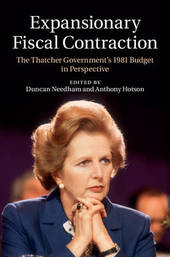
|
Expansionary Fiscal Contraction: The Thatcher Government's 1981 Budget in Perspective
Hardback
Main Details
| Title |
Expansionary Fiscal Contraction: The Thatcher Government's 1981 Budget in Perspective
|
| Authors and Contributors |
Edited by Duncan Needham
|
|
Edited by Anthony Hotson
|
| Physical Properties |
| Format:Hardback | | Pages:251 | | Dimensions(mm): Height 234,Width 155 |
|
| Category/Genre | Political economy
Public finance |
|---|
| ISBN/Barcode |
9781107042933
|
| Classifications | Dewey:336.94109048 |
|---|
| Audience | | Professional & Vocational | |
|---|
| Illustrations |
10 Tables, black and white; 9 Line drawings, unspecified
|
|
Publishing Details |
| Publisher |
Cambridge University Press
|
| Imprint |
Cambridge University Press
|
| Publication Date |
15 September 2014 |
| Publication Country |
United Kingdom
|
Description
In its 1981 Budget, the Thatcher government discarded Keynesian counter-cyclical policies and cut Britain's public sector deficit in the depths of the worst UK recession since the 1930s. Controversially, the government argued that fiscal contraction would produce economic growth. In this specially commissioned volume, contributors examine recently released archives alongside firsthand accounts from key players within No. 10 Downing Street, HM Treasury and the Bank of England, to provide the first comprehensive treatment of this critical event in British economic history. They assess the empirical and theoretical basis for expansionary fiscal contraction, drawing clear parallels with contemporary debates on austerity in Europe, USA and Japan in the wake of the recent global financial crisis. This timely and thoughtful book will have broad appeal among economists, political scientists, historians and policy makers.
Author Biography
Duncan Needham is a Research Fellow at Darwin College, Cambridge and Associate Director of the Centre for Financial History at Newnham College, Cambridge where he works on contemporary UK economic history. Before returning to academia, he worked as a credit trader at JP Morgan and then as a structured credit portfolio manager at Cairn Capital. Dr Needham lectures in Economic History and teaches undergraduate and graduate courses in history, economics and politics. Anthony Hotson is an associate member of the History Faculty at the University of Oxford, and a research associate of the Centre for Financial History at the University of Cambridge. He worked at the Bank of England during the 1980s, including a year on secondment as assistant commissioner at the newly formed Building Societies Commission. He also worked at McKinsey and Company before joining S. G. Warburg, where he was a corporate financier and director during the 1990s. Thereafter, he served as a non-executive director on a number of company boards in the insurance, fund management and banking sectors, as well as pursuing his academic interests. More recently, Dr Hotson has been a research fellow at the Winton Institute for Monetary History at the University of Oxford. He teaches macroeconomics and financial history, and has recently co-edited a book on the economic policies of the Thatcher government, and another on British financial crises since the nineteenth century. He is a non-executive director of Cenkos Securities plc and chairman of a charity, the Wadenhoe Trust.
Reviews'The arduous process of economic policy-making on the run is wonderfully exposed in this volume on the famous 1981 Budget. The reader is taken into the corridors of Great George Street and into the Faculties of Economics and should come away realising just how hard it is to do this stuff right.' Jagjit Chadha, University of Kent 'Budgets have redefined the economic policy of Britain: Gladstone's in 1853, Lloyd George's in 1909 - and Howe's in 1981. This excellent collection offers a sophisticated appreciation of the ideological divisions and political tensions of 1981 that brings together participants with a study of the archives. It is a major contribution to understanding the economic policies of our own time.' Martin Daunton, University of Cambridge 'Geoffrey Howe's highly controversial anti-Keynesian 1981 Budget, which significantly reduced the Government's fiscal deficit at the depth of a recession, was one of the more important turning points of the Thatcher era. A number of chapters in this book, in particular those by Sir Tim Lankester, the Treasury private secretary at Number 10 at the time, and Christopher Collins, the Director of the Margaret Thatcher Foundation, add usefully to our knowledge of how this historic event occurred.' Lord Lawson, former Chancellor of the Exchequer 'A rich collection of perspectives on a key and controversial turning point in Britain's modern economic management and performance. Brimming with insights and lessons for policy-makers, commentators and scholars.' Richard Roberts, Director of the Institute of Contemporary British History, King's College London 'This book makes an invaluable - indeed unique - contribution to the appraisal, not just of the 1981 Budget, which is its purpose, but of the whole edifice of thinking and analysis which underlay it. Indeed it raises in a fundamental form the question of what today the basis of macro-economic policy should be, if in fact there is any such thing. It is written by a variety of authorities - academics, journalists and former civil servants - and each brings to the discussion a perspective and insight which it would be difficult to match; and their conclusions, though by no means unanimous, are rigorously argued and well presented. This is a book not just for the academic specialist but for the general public as it struggles to understand how governments today make economic policy.' Sir Douglas Wass, former Permanent Secretary to the Treasury
|